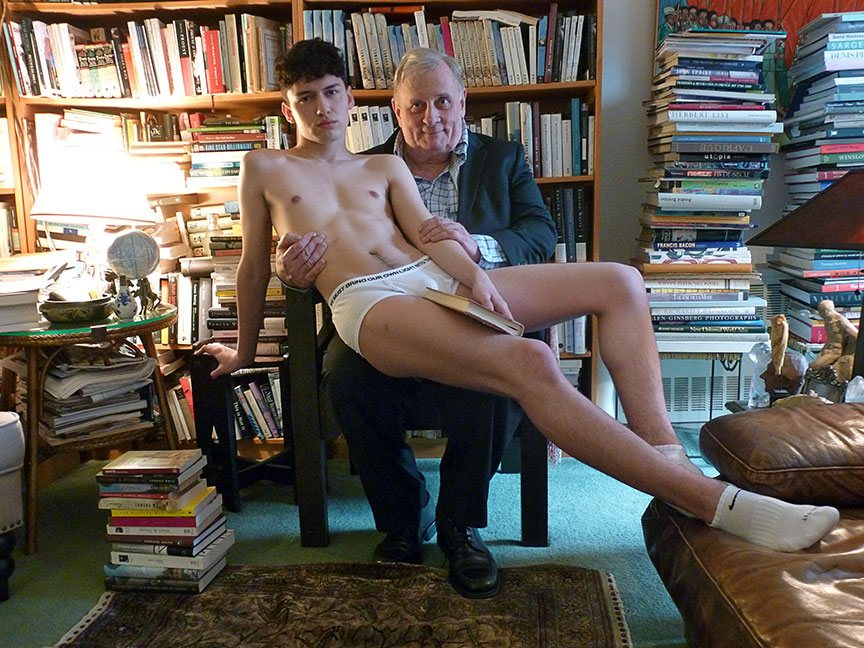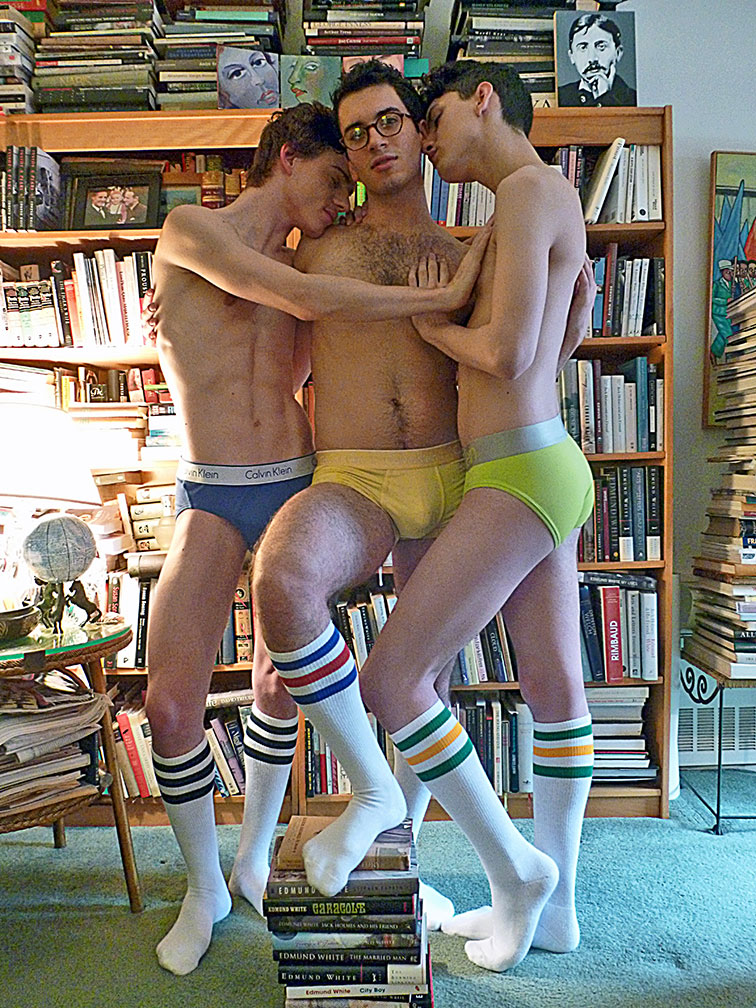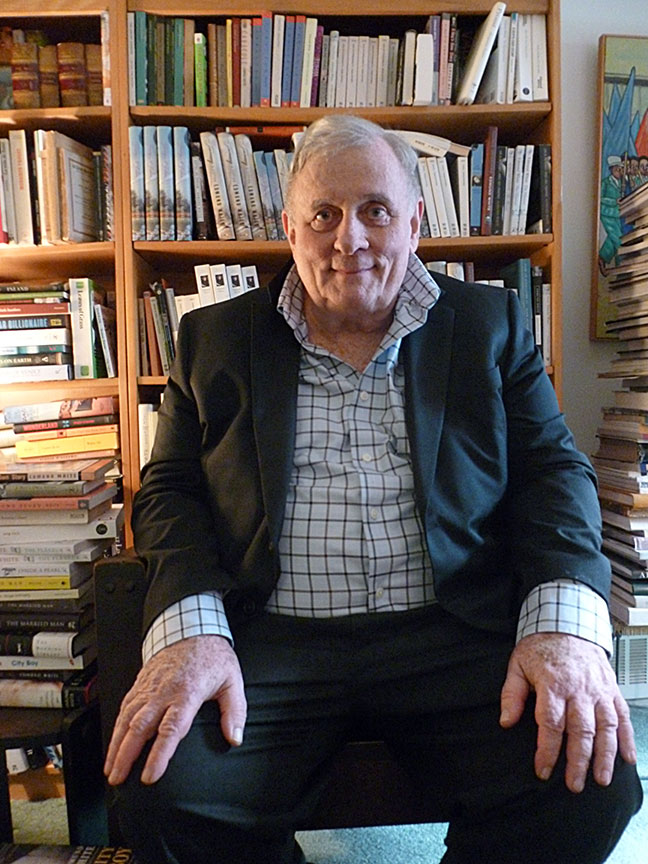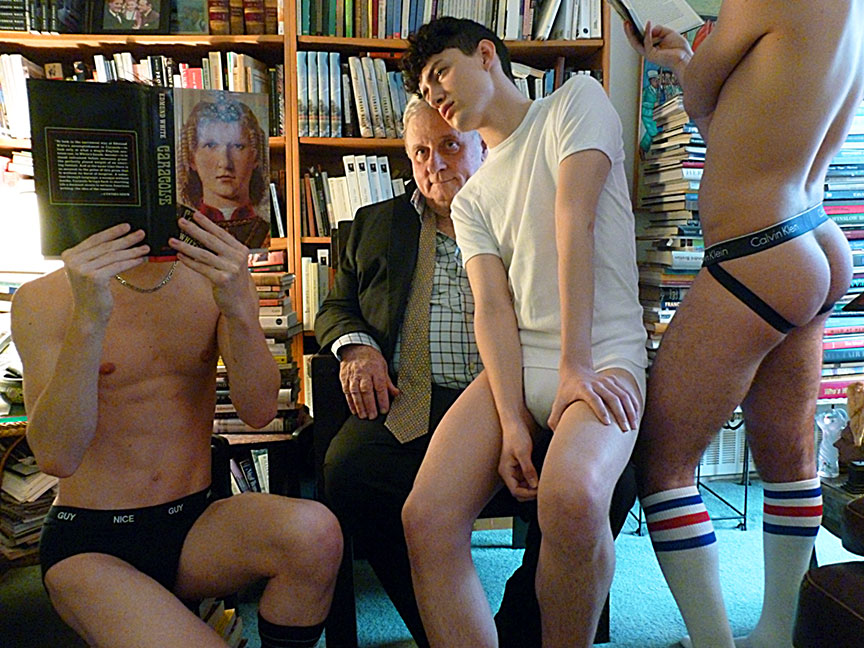Sissy Daddy Edmund White
Interview and portraits for Gayletter Magazine (US), Issue 4, Spring/Summer 2016
“Most writers have very boring lives,” Edmund White revealed in his interview for BUTT Magazine, while sucking on the interviewer’s toes. “I’m not like that at all because I was always a journalist, so I’ve met everybody from the Queen of Sweden to the Queen of England. I’ve known all the great writers, I slept with everybody and done everything. I mean, I feel like I don’t have a little life, I’ve had a big life, so far.”
He once described himself as a late bloomer. Now, in his mid-70s, White is regarded as one of the most prolific and celebrated contemporary writers, with an illustrious career spanning over 40 years and 25 books of fiction, nonfiction and memoirs translated into every major language. With such cult classics as A Boy’s Own Story and The Joy of Gay Sex under his belt, he has a special place in history as one of the pioneers of a new genre that is now being widely accepted as gay literature.
A keen observer, documentarian and survivor of the AIDS epidemic that claimed the lives of many of his peers, White has always been frank and unapologetic about his promiscuity and HIV-positive status. In his recent memoir, City Boy: My Life in New York During the 1960s and 1970s, he describes his sexual adventures at the Hudson piers, the favorite cruising spot for New York homos, which was well-documented by many important artists of the era, including Arthur Tress, Peter Hujar, David Wojnarowicz, and Alvin Baltrop:
From my aerie I would swoop down on men of all ages and shapes, usually late at night. Not that there was much happiness in a life of pleasure. Once I was in the backs of trucks or in the ruined piers along the Hudson, I simply couldn’t make myself go home. Even after a satisfying encounter with one man or ten I still wanted to hang around to see what the next ten minutes would bring. What it brought was the morning light, the sudden explosion of expensively shod feet on pavement as well-dressed men and women, pale from too much work and too many late nights and too little sleep, rushed out of their apartment buildings and hurried off to their jobs and I, in need of a shave and a bath, slunk home in semen-stiff jeans and a T-shirt that stank, my spirits depressed, my body thoroughly reamed. I mentioned that I sometimes felt I was too old for all this.
I first discovered White’s writings as a teenager in Moscow in the early 90s. His definitive biography of Jean Genet, which won the National Book Critics Circle Award, was one of the first books I read in English. When I was kicked out of Russia and found myself a queer refugee in New York, I was fortunate to meet Edmund in person. To this day, I cherish his hand-written letter where he praises my first essay in English with the account of my exile from Russia published in The Best of The Harvard Gay and Lesbian Review, for which he wrote an introduction.
Edmund and I have kept in touch over the years and I was troubled by the news of his health issues – he has suffered two strokes and a heart attack. Yet after a remarkable recovery, White went right back to work and he’s now about to release his latest novel, Our Young Man. After bumping into each other recently at my favorite Italian restaurant on Bleecker Street, I proposed to do a shoot and interview for Gayletter. Edmund agreed and a couple of weeks later we were shooting at his cozy Chelsea apartment filled with books, art and honorary degrees from various prestigious institutions. As per his requests, we had three beautiful boys posed after Antonio Canova’s classic lesbianic sculpture, The Three Graces, resting their feet on the stacks of White’s books in different languages.
We sat down for a chat on subjects ranging from the ever-changing gay trends and gentrification to dad/son role-play, fist-fucking and promiscuity in the digital age.

Slava Mogutin: My first question is about your book on Jean Genet. What drove you, an already established and reputable author, to immerse yourself in the life and work of this French literary outlaw? What influence has Genet had on your writing?
Edmund White: I liked the uncloseted, obsessional quality of Genet’s novels—and I realized he’d be the most difficult possible subject for a literary biography.
SM: Do you feel empathy for your biographical subjects and literary characters? Do you think you would get along with Genet, Arthur Rimbaud or Marcel Proust? Who would you get along with most—Genet, Rimbaud or Proust? Who least? Or maybe that’s too much like a fuck, marry, kill set-up…
EW: I think I would have most enjoyed Proust in spite of his whining. I would have most disliked Rimbaud, who was such a brat.
SM: Your memoirs are full of juicy anecdotes and personal accounts about many iconic personalities that you’ve met and befriended throughout your life in New York and Paris, from Vladimir Nabokov, William S. Burroughs and Susan Sontag to Robert Mapplethorpe, Patti Smith and Robert Wilson. The portraits you create are candid and three-dimensional but not always flattering. Did your writing ever get you in trouble or make you enemies? Are there any anecdotes you regret publishing?
EW: My novel Caracole turned Susan Sontag into an enemy—but fortunately we had a reconciliation before she died. I admired her very much, though she could be impossible.
SM: It’s no secret that many great writers used various substances in order to stimulate their creative juices: Rimbaud was an absinthe addict and hashish user; Jean Cocteau smoked opium; Burroughs was a heroin junky for most of his life; Allen Ginsberg was a big pothead; Aldous Huxley, Ken Kesey and Timothy Leary were on acid, and Aleister Crowley experimented with every illegal substance there was. Are there any particular vices that you’ve used or continue to use in order to fuel your creative mojo? How have they altered your writing?
EW: I’ve tried pot, LSD, cocaine and opium. I haven’t had a drink since 1983 but I wrote A Boy’s Own Story while drunk. I’d be so proud after I finished a chapter that I’d take months off before starting another.
SM: Writing is a creative muscle that demands regular exercise. If you don’t use it, you lose it, as they say. Every writer knows that writing is hard work that demands discipline, concentration and solitude—unless you find your perfect mood, Muse or inspiration. They also say that inspiration is for amateurs. When do you feel most productive? What keeps you going? And how has your process changed over time?
EW: Like the nineteenth-century writers I’ve always written for money—not great sums (which I can’t command), but just to pay the rent. I go months without writing, which only vaguely makes me feel guilty. I have no routine or schedule. Lorenzo Da Ponte, Mozart’s librettist, hired a young girl to “embrace” him every 30 minutes to keep him awake and working. I used to hire hustlers to show up at 4 am in order to keep me at my desk.
SM: Have you ever experienced writer’s block? What do you do when you lack motivation? Was it difficult for you to start writing again after your recent strokes?
EW: Strokes and heart attack. No, I wrote my Paris memoir while in the hospital. The only time I had writer’s block was after my first novel, when I had lost my confidence.
SM: You’ve been teaching creative writing for many years at some of the best US universities, and you’re still a professor at Princeton. How does teaching fit into your creative process—is it a calling, honor or burden? Did any of your students make it big? What’s your view on the new generation of young creatives?
EW: It surely helps to be with twenty or thirty young people all discussing technique. I’m lucky because I teach at Princeton where the undergrads are so smart.
SM: You’re considered one of the pioneers of gay literature. Is gay culture still relevant? Or are we being quietly assimilated and stripped of our rebellious roots? What aspects of our culture are under the greatest threat?
EW: High culture (literary fiction, ballet, serious music) used to be the special protectorate of gay men—but now they’ve been dumbed-down like most other Americans. The arts are now for small coteries—which is maybe for the best.

SM: One of your latest books, City Boy: My Life in New York During the 1960s and 1970s, offers many witty observations about the ever-changing trends of the gay subculture. Back then, the mustache was omnipresent. Now it’s the beard. How do you feel about this new trend? Are you pro-beard, like the silent gay majority, or, like me, decidedly anti-beard?
EW: I’m more attracted to what’s below the belt than to what’s above the shirt collar. I remember being puzzled over personal ads in Paris in the 80s in which a man was looking for someone style Santiag (i.e. in boots). Can’t you just buy boots if other men like them so much? I grew a mustache only because I though it would get me laid more often—and for a while it did!
SM: You co-authored the first-ever homo sex manual, The Joy of Gay Sex: An Intimate Guide for Gay Men to the Pleasures of a Gay Lifestyle, published in 1977. This book became an instant bestseller and was largely seen as a tribute to the golden age of pre-AIDS gay promiscuity and free love, before it all turned serious and deadly. Looking back, would you write that book differently?
EW: No. No one could have foreseen the AIDS epidemic. At the time we were criticized for being prudish because we warned against fist-fucking.
SM: You’ve addressed many previously hidden or taboo aspects of gay life, from promiscuity and addiction to dealing with the devastation of the AIDS epidemic and the loss of many close friends. Yet even in the darkest of your chapters there is a sense of consolation and hope. Where does this optimism come from?
EW: It’s probably congenital. My mother was an incurable optimist. And then I was raised as a Christian Scientist, which means you don’t believe in the existence of evil.
SM: One of the taboos you tackled is the subject of incest and your adolescent attraction to your dad. I think incest fantasy and Dad/Son role-play is becoming increasingly common amongst gays in the US—just look at Craigslist personal ads! Or is it a more universal trend?
EW: I think the incest taboo sets in when you know someone too well. But my father was very remote and my parents divorced when I was seven.
SM: You’re no stranger to online dating and social media, using your Sissy Daddy celebrity to your best advantage. How have your online encounters inspired or informed your writing?
EW: In my memoir My Lives I wrote a chapter called “My Hustlers” (I hired my first when I was sixteen).
SM: What are your thoughts on gay monogamy and marriage in this age of virtual promiscuity? For most of my friends monogamy seems to be a totally outdated concept.
EW: I’ve been with my darling husband for 20 years, possibly because we acknowledged right away that we were both sluts.
SM: In your memoirs you vividly capture two great cities that you’ve called home, New York and Paris. Now that you’re settled in New York, do you still feel a strong connection with France and French culture? What do you miss most about New York in the 1970s and Paris of the 1980s in light of ongoing mass gentrification?
EW: I suppose everyone misses his youth—at least being able to trick three times a day. Of course, a life entirely devoted to pleasure can be melancholy, but I would like (if I was courageous enough) to write a Casanova memoir about all the best sex I’ve had in sixty years.
SM: In your recent essay for the New York Times Magazine, ‘Why Can’t We Stop Talking About New York in the Late 1970s?’, you write about a bygone bohemian New York and its melding of high and lowbrow as captured in the photographs of Peter Hujar. What traces of this New York are visible today? What is the future of New York’s bohemian tradition? Is the city doomed to become a mere appendix to Wall Street, an island for the privileged?
EW: There will always be artistic and non-conformist youngsters in New York, if not in Manhattan itself. Where else would arty and ambitious people go in America?
SM: When you were a young man, you spoke openly about your leftist political views and your later disillusionment with Communism. Are you still politically involved? Do you vote? Who will you vote for in the 2016 election?
EW: Hillary.
SM: If the award-winning literary patriarch Edmund White had a chance to give some survival tips to your younger self, what would those do’s and don’ts be?
EW: Don’t lose heart. Keep writing. Anyway, what else would you do—be a banker?
Falling in Love Again (I Can't Help It) - music video starring Edmund White and Lev Ivankov

